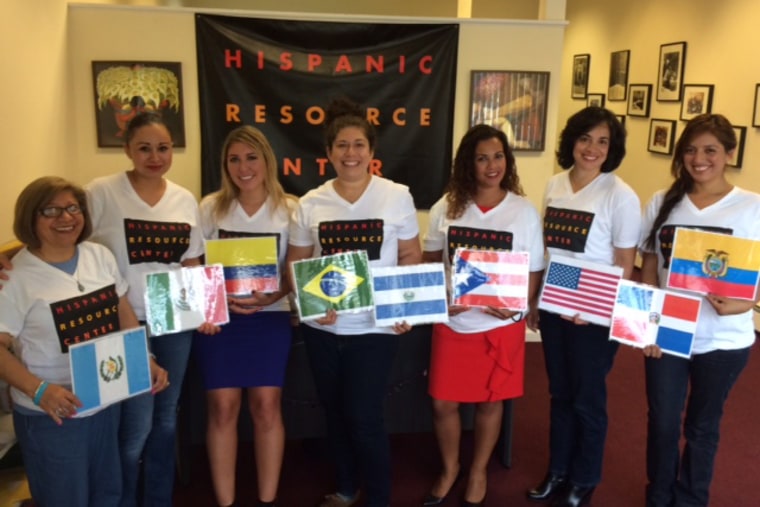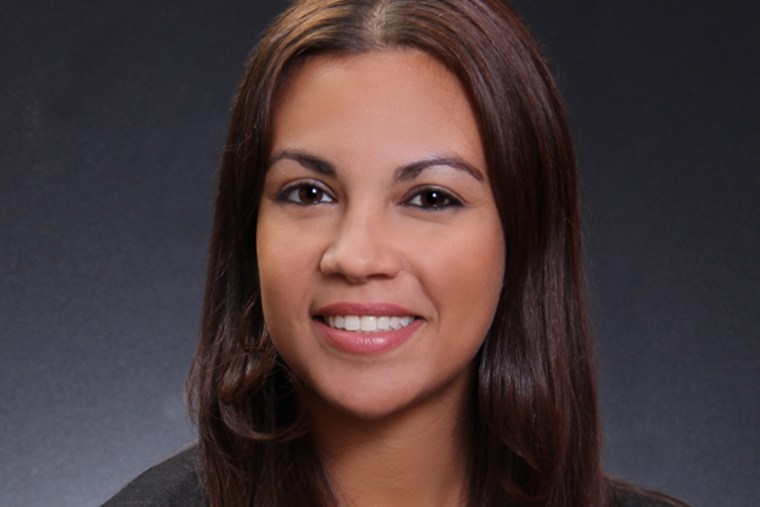Sept. 15 marked the start of National Hispanic Heritage Month — or, as it is known in Spanish, Mes de la Herencia Hispana — a time when the United States pays tribute to the history, culture and contributions of past and present Hispanic Americans.
According to the 2010 Census, 50.5 million Americans identify as Hispanic — and that number is growing. Immigration has long been a part of America’s national history, and the role that immigrants have played — and still play — in building this country is one of the reasons “the American dream” is still shared around the world today. America is a place where new beginnings and new lives are possible.
Over the next month, msnbc.com will be profiling outstanding Hispanic activists who are making a difference in the fight for immigration reform and who are providing critical support services to undocumented communities.
Name: Zoé M. Colón

City, State: Westchester, NY
Occupation/Organization: Executive Director of the Hispanic Resource Centerin Westchester for the past five years and Adjunct Professor of Latino Studies at Lehman College at the City University of NY since 2007
How did you get involved with immigration advocacy?
As a Puerto Rican born and raised in the Bronx, I wasn’t at all familiar with how different the new immigrant experience was. I started to get involved upon moving to Westchester County and working in concentrated new immigrant populations in Port Chester and Mamaroneck over the course of nine years. This is where I learned of the hardships of those living in the shadows due to immigration status and how it is confounded by isolation in suburban communities. When I came to the Hispanic Resource Center in 2009, it was on the heels of a very tumultuous time of anti-immigrant sentiment targeting some of the most vulnerable people in our community, day laborers or jornaleros. While the dust had settled in some respects, there was work to do and I had to hit the ground running.
Give us a sense of what your day looks like:
I am very blessed. Although I am an administrator with ample management responsibilities, we are a small grassroots organization and I am able to see the impact that we have on people’s lives every day. I can connect with a day laborer looking for work, chat with a mom in English as a Second Language class, have a taste of a great Guatemalan tamale with adult literacy students, and see a toddler playing joyfully in our waiting area while his/her mom receives immigration assistance - all in one day. I am also often out of the office connecting with other agencies locally and nationally which allows our agency to ensure that immigrant needs are prioritized but also to learn from other advocates in the movement.
What is the biggest misconception about immigration reform/undocumented citizens?
One of the biggest misconceptions is that immigration reform is mostly an issue of safety or fighting terrorism. It has everything to do with labor supply and demand. We can see that historically immigration policy is inextricably linked to the health of our economy. Migration is driven by job opportunities. As such, the conversation around immigration policy must include an honest look at labor. Among other important components, we must revisit and include modifications to guest worker programs and immigration quotas by country to match the demand and the realities of the labor market.
What is your expectation of President Obama and Congress in regard to the border crisis? Were you surprised by the president’s decision to delay executive action until after the midterms?
Numerous studies show that the recent unaccompanied minors crisis is due to violence and life threatening circumstances in Central America- particularly Honduras, El Salvador and Guatemala. They are most often fleeing danger and must be granted due process under the law. I thought that it goes without saying, that we must protect these children and ensure that they are treated humanely. However, I am still in disbelief of the conditions that these children have had to live in while in custody and appalled at the anti-immigrant backlash especially in the south. Ironically, these states were once part of Mexico and Latin America.
"Ironically, these states were once part of Mexico and Latin America."'
As far as the delay on executive action, I was disappointed but not surprised. If we cannot get it together, we should not be deporting people that may very well qualify to stay based on provisions for a pathway to legalization. This is why we should stop all deportations immediately.
It is disheartening that millions of families are being torn apart and that children are risking their lives to cross the border and even then -- even in the face of this “humanitarian crisis” -- we cannot get our elected officials to move on this. We simply cannot afford to play the political game anymore. These are human beings.
What type of help is most needed on the ground and how can one get involved?
If you asked me three years ago, I would have said social services, immigration assistance and legal representation and a host of adult education programs that build skills and self sufficiency. We set out to build that capacity at Hispanic Resource Center and we have developed a strong safety net of services and programs in response to multifaceted needs. However, in hindsight, I would have coupled those with a strong community leadership development component, one that we are focusing on this year. I have come to realize that no one organization, teacher, volunteer or advocate can do this work for the community. The community has to organize itself, build on its assets, determine what it needs, and strengthen the skills for civic engagement and to effect policy. We need help strengthening that leadership potential.
What keeps you motivated every day?
First and foremost, my mothers’ sacrifices as a Puerto Rican immigrant, single mother, who started as a factory worker in the garment industry and worked multiple retail low wage jobs to give me the opportunities that she didn’t have. I am also deeply moved and inspired by the workers and families that we advocate for. I am both angered and motivated by the fact that despite being treated as second class citizens and being virtually invisible to the families and communities they help build and work for, these families are resilient and have profound humility and dignity. It gives me the fuel to march forward regardless of the ignorance and adversity, pa’lante!
Stay in touch with Zoe's organization on Facebook.
